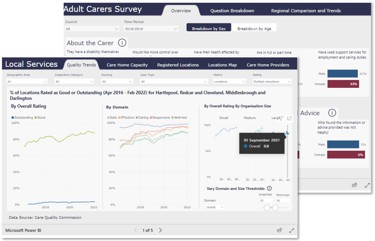Tees Valley - Case Study
Digitising Market Position Statements: Tees Valley Collaborate for MPS Success

Introduction
While implementing Access PAMMS Demand Model, Carl Johnson, Information Analyst, at Middlesbrough Council, spotted an opportunity to take a more dynamic approach to their Market Position Statement (MPS) by optimising their data and market oversight.
Carl comments: “We recognised that a good MPS can help to facilitate boundary collaboration with other local authorities and provide market oversight to help market shaping. By better sharing this information with providers, we hoped to encourage greater levels of innovation by offering real insight into the support needed in our care market.”
The Problem
Carl continues: “As we were exploring how to make best use of our data, we recognised that this information would be helpful published in a public-facing, explorable format. We get a lot of FOI requests, and recognised that a self-service tool would be incredibly helpful.
Unfortunately, our existing MPS did not meet this criteria. It was difficult to refresh with new information and often the data was out of date by the time it was published. It was also very text heavy, and really hard to find the insight you were looking for.”
Polly Wright, Commissioning Team Leader – Prevention, Middlesbrough Council, adds: “It wasn’t very useful to providers because our usage information was out of date, and it was really hard to find what you were looking for. There was very little evidence that providers were using the MPS to influence their business decisions.”
The Solution
To best support the disrupted care market, Middlesbrough Council recognised the importance of creating a self-service MPS. The goal was to empower providers with the ability to view data and market insights in a clear and comparable format, while being able to filter and explore the data analytics on offer to best inform their business plans.
By implementing a simplified version of our Access PAMMS Social Care Landscape tool, Middlesbrough Council transformed their existing labour-intensive model for MPS construction and allowed the local authority to offer their service providers a comprehensive, explorable and always up-to-date analysis of the local care market.
Improving Local Authority and Provider Collaboration
Despite being in a period of significant change in the way public services are delivered, Middlesbrough Council recognised the opportunity to make use of their wealth of data and the importance of sharing this insight across other locations in the Tees region.
Working with Darlington, Hartlepool, Redcar and Cleveland, Middlesbrough Council saw the value of co-producing Market Position Statements to clearly set out, through market facilitation and commissioning activity, the vision for adult social care activity across the region.
Polly Wright, Service Manager, comments “As a small group of local authorities it’s brilliant that providers are able to have a view of Middlesbrough and the wider area. We are hoping that being able to view data on a granular level and understand service needs across boundaries will help providers to find new, innovative solutions.
For example, a new care solution could be working across Tees Valley, as opposed to just focussing in on one local authority. Being able to group data together as Tees Valley undoubtedly adds more weight to the MPS.”
Carl Johnson adds “It was great to come together and hear from different colleagues across the region. We all have different views and experiences, and that allowed us to debate and discuss new ways of working. This allowed us to really get it right and consider all angles when implementing the new MPS to ensure all parties get the most from it.”
The Benefits
Through working in collaboration to produce their MPS, and utilising PAMMS Social Care Landscape technology, Middlesbrough Council and Tees Valley local authorities have created an easy-to-find, explorable and comprehensive overview of their local care market.
Benefits include:
- Automation that saves days of manual labour.
- Information is presented clearly on an easy to navigate public-facing web page.
- FOI request can be self-served.
- Providers are empowered to make informed business decisions and have visibility of market influences and challenges.

